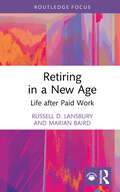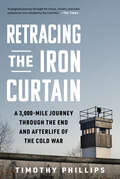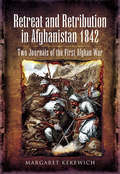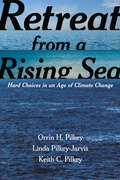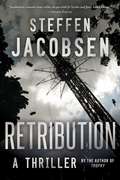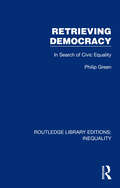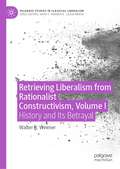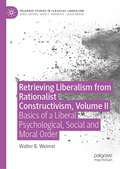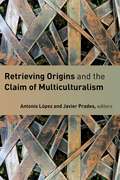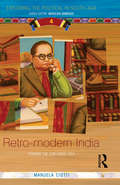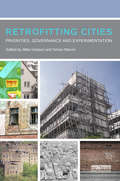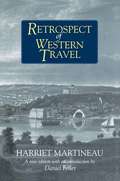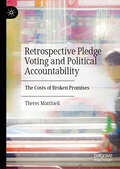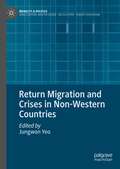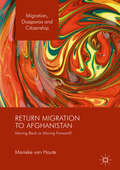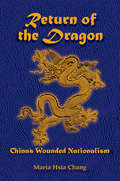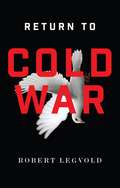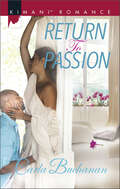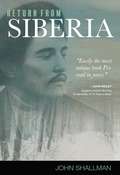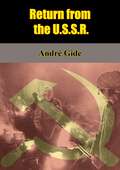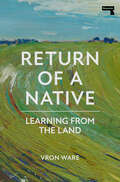- Table View
- List View
Retiring in a New Age: Life after Paid Work (Routledge Focus on Business and Management)
by Marian Baird Russell D. LansburyThis book examines the concept of retirement, how it has changed, and what the future holds for the next generation of retirees.The book analyses government data and university surveys of more than 1,000 retirees in Australia and 4,000 retirees in Sweden, as well as in-depth interviews with retirees in each country. It demonstrates that while both countries have differences in their retirement policies and practices, as well as the outcomes for retirees, the process of retirement is undergoing change in both countries as people retire at a range of ages, but often then re-enter the workforce for various reasons. The book proposes four distinctive post-retirement orientations: Stayers, Leavers, Blenders and Disengaged retirees. It then discusses how individuals, employers and governments are responding to the challenges of ‘retiring in a new age’, suggesting policies and a new social contract for retirees that addresses their needs for economic security, physical and mental health, as well as engagement with the wider community.A book of keen interest to scholars of employment and work relations, human resource management, as well as labour economics. Policymakers and students interested in employment issues that affect economic and social equality will also find the book’s framework fit for use. A full set of interview transcripts and discussion questions is available on the Routledge webpage for download: www.routledge.com/9781041118329
Retracing the Iron Curtain: A 3,000-mile Journey Through The End And Afterlife Of The Cold War
by Timothy PhillipsAcross 3,000 miles and over eight decades, this epic new people’s history of the Cold War makes eye-opening sense of a defining 20th-century conflict—and how it continues to shape our world today. Initially a victory line where Allies met at the end of World War Two, the Iron Curtain quickly became the front of a new kind of war. It divided Europe from north to south for a staggering forty-five years. Crossing it in either direction was always a political act; in many cases, it was a crime to even talk about doing so. New generations have grown up since these borders came down, freed from the restrictions of the Cold War era. But what has the Iron Curtain left in its wake? Timothy Phillips travels its full 3,000-mile route—from inside the Arctic Circle to where Armenia meets Azerbaijan and Turkey—to craft this epic new people’s history of a defining 2oth-century conflict. Here, in the borderlands where a powerful clash of civilizations took form in concrete and barbed wire, he uncovers the remarkable stories of everyday people forever imprinted by life in the Curtain’s long shadow. Some look back on the era with nostalgia, even affection, while others despise it, unable to forgive the decades of hardship their families and nations endured. A director recalls the astonishing night his movie premiered in East Germany—November 9, 1989, the very night the Berlin Wall fell. And a railroad worker recounts the 1951 hijacking of a passenger train from Czechoslovakia that breached the Curtain, granting those aboard immediate asylum in the West. These narratives, by turns harrowing and heartening, paint a vivid portrait of the new Europe that emerged from the ruins. Phillips reveals the Iron Curtain’s profound impact on our world today—even as he punctures the fault lines we draw. Publisher’s note: This book was published in the UK under the title The Curtain and the Wall.
Retreat and Its Consequences
by Robert J. LieberWhat are the consequences of retreat and retrenchment in foreign policy? In recent years, America has pulled back from its long-time role of international leadership. In doing so the Obama administration has sought to conciliate adversaries, shown indifference to allies; called upon the international community to step in; proclaimed and then disavowed 'red lines'; and preferred to lead from behind in the face of catastrophic civil war in Syria, ISIS barbarism in the Middle East and North Africa, Russia's predatory behavior in Eastern Europe, and China's muscle-flexing in East Asia. The consequences of this 'realist' experiment have been costly and painful, and it has caused the US to lose credibility with friends and foes. America retains the capacity to lead, but unless it resumes a more robust role, the world is likely to become a more dangerous place, with mounting threats not only to regional stability and international order, but to the national interests of America itself.
Retreat and Retribution in Afghanistan 1842: Two Journals of the First Afghan War
by Margaret KekewichThe blow to British pride and confidence caused by the crushing defeat of their army in Afghanistan during the winter of 1841/2 compares in its impact to the disaster in New York on 11 September 2001. The British had replaced a popular and effective monarch with a weak one in the mistaken belief that he would keep the Russians at bay. Two years later, nearly all the British and Indian soldiers in the region were killed in a popular uprising.Margaret Kekewichs perceptive new study of the conflict describes the British defeat, their reoccupation of Afghanistan in the spring of 1842, then their final withdrawal at the end of the year. Her account, which is based on the graphic diaries written by two British eyewitnesses, gives a fascinating insight into the conflict in Afghanistan 150 years ago.The story is told by, first, Lady Sale who together with over 100 women, children and soldiers was captured and imprisoned by the Afghans. The second account comes from the Reverend Allen, a young chaplain to the army that invaded Afghanistan in April 1842 to avenge British humiliation and rescue the prisoners. Both these eyewitnesses deplored the follies that had led to war and defeat and also the suffering that was inflicted on many innocent Afghans.At a time when British forces are deeply engaged in another war in Afghanistan, Margaret Kekewich offers a balanced and thought-provoking new perspective on a previous conflict in the region.
Retreat from a Rising Sea: Hard Choices in an Age of Climate Change
by Orrin H. Pilkey Linda Pilkey-Jarvis Keith C. PilkeyMelting ice sheets and warming oceans are causing the seas to rise. By the end of this century, hundreds of millions of people living at low elevations along coasts will be forced to retreat to higher and safer ground. Because of sea-level rise, major storms will inundate areas farther inland and will lay waste to critical infrastructure, such as water-treatment and energy facilities, creating vast, irreversible pollution by decimating landfills and toxic-waste sites. This big-picture, policy-oriented book explains in gripping terms what rising oceans will do to coastal cities and the drastic actions we must take now to remove vulnerable populations.The authors detail specific threats faced by Miami, New Orleans, New York, and Amsterdam. Aware of the overwhelming social, political, and economic challenges that would accompany effective action, they consider the burden to the taxpayer and the logistics of moving landmarks and infrastructure, including toxic-waste sites. They also show readers the alternative: thousands of environmental refugees, with no legitimate means to regain what they have lost. The authors conclude with effective approaches for addressing climate-change denialism and powerful arguments for reforming U.S. federal coastal management policies.
Retreat from a Rising Sea: Hard Choices in an Age of Climate Change
by Orrin H. Pilkey Linda Pilkey-Jarvis Keith C. PilkeyThis sobering examination of climate-change and the disastrous effects of rising sea levels explains what must be done to avoid the worst outcomes. By the end of this century, hundreds of millions of people living at low elevations along coasts will be forced to retreat to higher and safer ground. Because of sea-level rise, major storms will inundate areas farther inland and will lay waste to critical infrastructure, such as water-treatment and energy facilities, creating vast, irreversible pollution by decimating landfills and toxic-waste sites. Retreat from a Rising Sea explains in gripping terms what rising oceans will do to coastal cities—detailing the specific threats faced by Miami, New Orleans, New York, and Amsterdam. This policy-oriented book then lays out the drastic actions we must take now to remove vulnerable populations. Aware of the overwhelming social, political, and economic challenges that would accompany effective action, the authors consider the burden to the taxpayer and the logistics of moving landmarks and infrastructure, including toxic-waste sites. They also show readers the alternative: thousands of environmental refugees, with no legitimate means to regain what they have lost. The authors conclude with effective approaches for addressing climate-change denialism and powerful arguments for reforming U.S. federal coastal management policies.
Retribution and Reparation in the Transition to Democracy
by Jon ElsterThe contributions in this study present a comprehensive analysis of transitional justice from 1945 to the present. They feature a general theoretical analysis of the processes of retribution and reparation as well as case studies by historians and political scientists who discuss the West European transitions after 1945 and more recent Latin American, East European, and South African transitions to democracy in the 1980s and 1990s. The volume's focus is on retribution against the leaders and agents of the autocratic regime preceding the democratic transition, and on reparation to its victims.
Retribution: A Thriller
by Steffen JacobsenOn a warm Autumn afternoon, Denmark's largest amusement park, Tivoli Gardens, is devastated by a terrorist attack that leaves more than 1,200 dead. No one claims responsibility for the attack, and seven months later the nation is still reeling and the police have no leads. Police Lieutenant Lene Jensen has been assigned to the frustrating case from the beginning. When she receives a desperate phone call from a Muslim woman who later turns up dead, she sees a connection to the Tivoli bombing. Lene's initial investigation suggests that the woman was unknowingly part of a secret research project conducted by the government, and as she digs deeper, she is met with increasing resistance from her superiors. Together with private detective Michael Sander, she tries to get to the bottom of the complicated case--only to realize that someone knows a lot more than they are letting on. With the threat of another attack looming, Sander and Jensen must race against the clock to save lives and restore peace of mind to the people of the idyllic country.
Retrieving Democracy: In Search of Civic Equality (Routledge Library Editions: Inequality #4)
by Philip GreenOriginally published in 1985, Retrieving Democracy offers a thorough and systematic answer to the familiar objection that genuine democracy is utopian. The book outlines an imaginary, yet imaginable, society that would be non-racist, non-sexist, and sufficiently classless to support true civic equality. Moving beyond previous discussions of re-industrialization and economic democracy, the book proposes the social control of corporations; a democratic division of labour that would maximize equality of citizenship rather than merely the production of commodities; the democratization of trade unions; the equalization of wages and job opportunities and the insulation of electoral politics from the power of money.
Retrieving Liberalism from Rationalist Constructivism, Volume I: History and Its Betrayal (Palgrave Studies in Classical Liberalism)
by Walter B. WeimerThis first volume, History and its Betrayal, traces the development of major themes of liberalism from the increase in human population beyond the limits of the face-to-face society of tribalism and small groups up until the present day. It shows that the principles underlying liberalism are the evolutionary development of social organizations that have resulted from the complexity of human action rather than any conscious design or purpose.This book draws out the differences between the classical liberalism dependent upon spontaneous and tacit ordering as a result of evolution, and the explicit or conscious or directed version of progressivism. It shows that the most important recent developments in the philosophy of rationality and the methodology of scientific research, as well as in evolutionary epistemology and the philosophy of biology, actually stem from the theories of complex social organization of the moralists such as Hume, Ferguson, and Smith. The book shows clearly that classical liberalism was never refuted—indeed, no attempt to do so has been offered—it has simply been ignored in favour of programs which sound beneficial and soothing but which cannot be instituted without returning to tribalism.
Retrieving Liberalism from Rationalist Constructivism, Volume II: Basics of a Liberal Psychological, Social and Moral Order (Palgrave Studies in Classical Liberalism)
by Walter B. WeimerThis second volume, Basics of a Liberal Psychological, Social and Moral Order, overviews developments in the theory of spontaneously ordered complex phenomena, the psychology of inference and expectation, the nature of anticipatory systems in the psychological and economic domains, and the evolution of scientific thought and knowledge. The book applies these insights to the nature of markets and morals, what education should consist of, and the problems of alienation and our existential malaise as we move into an increasingly abstract society. In doing so it also shows the unscientific nature of the rationalist constructivist approach of progressivism, and the disastrous consequences that would arise from following these positions. The book shows the complex interplay between top-down or directed structures (what Hayek and others have called taxis organizations) and far more complex orders of the social or psychological cosmos in which they are embedded as constituents. It details how the key to the market orders of society depends upon their capacity to impersonally convey information to agents. Markets can serve unknown and unforeseen ends for individuals who do not know or have contact with other market participants. This is a vastly more powerful and productive system than anything that can arise in a tribal or face-to-face organization limited to personal contact, such as the sort proposed by the constructivists. The book will be of interest to academics and scholars in classical liberalism, economics and political philosophy.
Retrieving Origins and the Claim of Multiculturalism
by Antonio Lopez Javier Prades Angelo ScolaThis book explores the philosophical, legal, and theological roots of Western multiculturalism, that is, the encounter and coexistence of different cultures within a liberal society. Rather than concerning themselves with the particulars of cultural dialogue, the authors of this volume go deeper and question the very reality of "multiculturalism" itself.As a whole the volume devotes attention to the origins of human nature, arguing that regardless of how different another person or culture seems to be, universal human experience discloses what it means to be human and to relate to others and to God. The contributors represent different cultures and faith traditions but are united in friendship and in the conviction that the Christian faith enables an authentic approach to long-standing debates on multiculturalism.Contributors:Massimo BorghesiFrancesco BotturiMarta CartabiaCarmine Di MartinoPierpaolo DonatiCostantino EspositoStanley HauerwasAntonio LopezFrancisco Javier Martínez FernandezJohn MilbankJavier PradesDavid L. SchindlerAngelo Cardinal ScolaLorenza VioliniJoseph H. H. Weiler
Retro-modern India: Forging the Low-caste Self (Exploring the Political in South Asia)
by Manuela CiottiFirmly situated within the analytics of the political economy of a north Indian province, this book explores self-fashioning in pursuit of the modern amongst low-caste Chamars. Challenging existing accounts of national modernity in the non-West, the book argues that subaltern classes shape their own ideas about modernity by taking and rejecting from models of other classes within the same national context. While displacing the West — in its colonial and non-colonial manifestations — as the immanent comparative focus, the book puts forward a unique framework for the analysis of subaltern modernity. This builds on the entanglements between two main trajectories, both of which are viewed as the outcome of the generative impetus of modernisation in India: the first consists of the Chamar appropriation of socio-cultural distinctions forged by 19th-century Indian middle classes in their encounter with colonial modernity; the second features the Chamar subversion of high-caste ideals and practices as a result of low-caste politics initiated during the 20th century. The author contends that these conflicting trends give rise to a temporal antinomy within the Chamar politics of self-making, caught up between compulsions of a past modern and of a contemporary one. The eclectic outcome is termed as ‘retro-modernity’. While the book signals a politics of becoming whose dynamics had previously been overlooked by scholars, it simultaneously opens up novel avenues for the understanding of non-elite modern life-forms in postcolonial settings. The book will interest scholars of anthropology, South Asian studies, development studies, gender studies, political science and postcolonial studies.
Retrofitting Cities: Priorities, Governance and Experimentation
by Mike Hodson and Simon MarvinDeveloping an up-to-date critical framework for analysing urban retrofit, this is the first book to examine urban re-engineering for sustainability in a socio-technical context. Retrofitting Cities examines why retrofit is emerging as an important strategic issue for urban authorities and untangles the mix of economic, competitive, ecological and social drivers that influence any transition towards a more sustainable urban environment. Retrofitting Cities comparatively explores how urban scale retrofitting can be conceptualised as a socio-technical transition; to critically compare and contrast different national styles of response in cities of the north and global south; and, to develop new research and policy agendas on future development of progressive retrofitting. Bringing together a group of researchers from a variety of disciplinary backgrounds that reflect the complexity of the research challenge, Retrofitting cities looks across different infrastructures and types of built environment, dealing with diverse urban contexts and examining formal as well as community responses. This is a uniquely practical book for urban planning and policy professionals as well as for researchers in urban studies and urban design.
Retrofitting Suburbia, Updated Edition: Urban Design Solutions for Redesigning Suburbs
by June Williamson Ellen Dunham-JonesUpdated with a new Introduction by the authors and a foreword by Richard Florida, this book is a comprehensive guide book for urban designers, planners, architects, developers, environmentalists, and community leaders that illustrates how existing suburban developments can be redesigned into more urban and more sustainable places. While there has been considerable attention by practitioners and academics to development in urban cores and new neighborhoods on the periphery of cities, there has been little attention to the redesign and redevelopment of existing suburbs. The authors, both architects and noted experts on the subject, show how development in existing suburbs can absorb new growth and evolve in relation to changed demographic, technological, and economic conditions. Retrofitting Suburbia was named winner in the Architecture & Urban Planning category of the 2009 American Publishers Awards for Professional and Scholarly Excellence (The PROSE Awards) awarded by The Professional and Scholarly Publishing (PSP) Division of the Association of American Publishers
Retrospect of Western Travel: In Three Volumes, Volume 2 (Cambridge Library Collection - North American History Ser. #Volume 2)
by Harriet Martineau Daniel FellerThis abridged version of Harriet Martineau's narrative of her travels in Jacksonian America preserves her reporting on slavery and other current topics of the day, as well as her insights on women's place in society, and her observations and vignettes of famous people such as John Calhoun.
Retrospective Pledge Voting and Political Accountability: The Costs of Broken Promises
by Theres MatthießThis book examines retrospective pledge voting; the phenomenon of whether and under which conditions citizens are likely to withdraw their support for political parties that have failed to turn their pre-election pledges into tangible policies once they have joined government. It puts forward a new theoretical framework on retrospective pledge voting. Whilst one would expect voters to punish government parties that have broken their promises by refusing to vote for them at the next election, little research has been done to show whether, and under what contexts, this is actually the case. Adopting a multi-methods approach, the book demonstrates that citizens do punish government parties that have shown a poor performance in fulfilling their election pledges, and that more sceptical citizens with negative pre-existing opinions punish pledge breakage more severely. Bringing together research on election pledges, government performance and voting, the book will appeal to all those interested in democratic representation, politics, public policy, and voter-party linkages.
Return Migration and Crises in Non-Western Countries (Mobility & Politics)
by Jungwon YeoThis edited book focuses on the intersection of return migration and crises in non-Western countries. The book explores a wide range of theoretical and methodological perspectives while offering practical insights to address the intricate issues surrounding return migration and crises. The topics covered within this volume include return migration trends, the pivotal roles and contributions of return migrants, the social, psychological, and policy challenges faced by returnees, emerging issues stemming from return migration in their home countries, and the public and formal responses to return migration and the reintegration of returnees, and the roles of crises in these areas.This edited volume brings together diverse perspectives of academic researchers, practitioners, and policymakers on return migration. The book features cases of multiple non-Western countries in Asia (Philippines, China, India), Europe (Lithuania, Turkey, & Ukraine), the Middle East and North Africa (Morocco), and South America and the Caribbean (Mexico, Peru & Dominican Republic). Findings provide a unique opportunity to critically explore current thinking on return migration and investigate the relationship between migration and crisis from varying policy and operational viewpoints. This book, hence, attends to practitioners to develop creative solutions to both global and local policies and practices of return migration management in emerging market countries, which will support and accommodate both their returnees and residents amid challenging times.
Return Migration to Afghanistan: Moving Back or Moving Forward? (Migration, Diasporas and Citizenship)
by Marieke van HouteThis book overcomes the dichotomies, generalizations and empirical shortcomings that surround the understanding of return migration within the migration–development–peace-building nexus. Using the concept of multidimensional embeddedness, it provides an encompassing view of returnees’ identification with and participation in one or multiple spaces of belonging. It introduces Afghan return migration from Europe as a relevant case study, since the country’s protracted history of conflict and migration shows how the globally changing political discourses of recent decades have shaped migration strategies. The author’s findings highlight the fact that policy is responding inadequately to complex issues of migration, conflict, development and return, since the expectations on which it is based only account for a small minority of returnees. This thought-provoking book will appeal to scholars of migration and refugee studies, as well as a wider audience of sociologists, anthropologists, demographers and policy makers.
Return Of The Dragon: China's Wounded Nationalism
by Maria H ChangAs Maoism recedes, and especially after the 1989 Tiananmen Square massacre, Beijing has increasingly turned to patriotic nationalism for its ideological inspiration and legitimation. Return of the Dragon begins with a discussion of the definitions, typologies, and theories of nationalism. The formation and development of the Chinese people are explored, including their myths of origins, early beginnings, the classical feudal period, and the enduring state and empire of the Middle Kingdom. The Opium War began the ?hundred years of humiliation? when dynastic China steadily deteriorated and eventually succumbed to the forces unleashed by imperialism. Western and Japanese imperialism also transformed the Chinese from a people into a nation. The ideas of early Chinese nationalists are explored, particularly those of Sun Yat-sen, whose thought stands in stark contrast to those of Mao, but shares significant similarities with the developmental nationalism of Deng Xiaoping.The last chapters of Return of the Dragon describe contemporary China's patriotic nationalism as it is represented in the writings of Chinese intellectuals, the youth, and the military. The portrait that emerges is a disquieting mix of narcissism and insecurity, wounded pride and resentment, a Darwinian worldview and an irredentist resolve to restore China to its former glory. The book concludes with an examination of the Chinese polity that remains authoritarian, as well as U.S. policy implications.
Return To Cold War
by Robert LegvoldThe 2014 crisis in Ukraine sent a tottering U. S. -Russian relationship over a cliff - a dangerous descent into deep mistrust, severed ties, and potential confrontation reminiscent of the Cold War period. In this incisive new analysis, leading expert on Soviet and Russian foreign policy, Robert Legvold, explores in detail this qualitatively new phase in a relationship that has alternated between hope and disappointment for much of the past two decades. Tracing the long and tortured path leading to this critical juncture, he contends that the recent deterioration of Russia-U. S. relations deserves to be understood as a return to cold war with great and lasting consequences. In drawing out the commonalities between the original cold war and the current confrontation, Return to Cold War brings a fresh perspective to what is happening between the two countries, its broader significance beyond the immediate issues of the day, and how political leaders in both countries might adjust their approaches in order, as the author urges, to make this new cold war "as short and shallow as possible. "
Return To Passion
by Carla BuchananLovers at long last? Behind her good-girl facade, Camille Ryan harbored a secret desire to write erotic romances. When one of her racy stories fell into the wrong hands, she had no choice but to flee her Bible-thumping Georgia town. Now her father's unexpected health scare turns her world upside down and brings the pseudonymous author back home to Fairdell-and to the man she sacrificed her happiness to protect. Remington Krane never got over losing Camille. When he shows up on her doorstep demanding answers, desire once again ignites, culminating in a night of passion they've waited years to fulfill. Camille fears the scandalous truth could ruin the business scion's mayoral bid. But when another woman orchestrates a campaign that could sabotage his second chance with Camille, it's Remi's turn to give up everything-except the woman he loves.
Return from Siberia
by John ShallmanIn the lead-up to the Bolshevik Revolution, one young revolutionary is condemned to exile in Siberia; a hundred years later, his ancestors discover his story and learn just how much history has repeated itself. In the midst of running a long-shot political campaign, Democratic political consultant John Simon discovers a 100-year-old manuscript written by his grandfather Joseph—a brilliant young revolutionary whose exile to Siberia by the last czar of Russia is just the beginning of an extraordinary tale of survival, romance, and revolution. Return From Siberia chronicles not only the Simon family's relationship to each other and the past, but also the remarkable story of a young man who sacrificed everything for his political ideals. As Joseph's manuscript is translated, chapter-by-chapter, the Simon family is pulled deep into their ancestor&’s story— in particular, the bitter rivalry between two brothers, whose competing visions of the American Dream are played out on the campaign trail and in their lives. Return from Siberia is a timely appraisal of modern politics and society juxtaposed with an inside look into the machinations of a young political mind 100 years ago. The true story documents an extraordinary time of political upheaval in Russia and Europe just prior to World War I while also drawing parallels to current day American politics and the current philosophical and ideological debates about immigration, Democratic Socialism, and Capitalism. Beyond the deep social, political, and philosophical themes, there is romance, adventure, betrayal, suspense, and the struggles of families today and in yesteryear. Return from Siberia illustrates how one modern family's connection to the past helps them resolve their future.
Return from the U.S.S.R.: Retour De L' U. R. S. S.
by André GideDuring the 1930s, Gide briefly became a communist, or more precisely, a fellow traveller (he never formally joined the Communist Party). As a distinguished writer sympathising with the cause of communism, he was invited to tour the Soviet Union as a guest of the Soviet Union of writers. The tour disillusioned him and he subsequently became quite critical of Soviet Communism. This criticism of Communism caused him to lose socialist friends, especially when he made a clean break with it in this book Return From The USSR first published in the 1930's.-Print ed.
Return of a Native: Learning from the Land
by Vron WareFrom a fixed point in the middle of English nowhere, Vron Ware takes you through time and space to explain why transcending the urban-rural divide is integral to the future of the planet.Rural England is a mythic space, a complex canvas on which people from many different backgrounds project all kinds of fantasies, prejudices, desires and fears. This book seeks to challenge many of these ideas, showing how the artificial divide between rural and urban works to conceal the underlying relationship between these two fundamental poles of human settlement.This investigation of rurality is oriented from a fixed point in north-west Hampshire, marked by a signpost that points in four directions to two towns, four villages and two hamlets. Through stories, interviews and reportage gathered over two decades, the book demolishes tired notions of rural England that cast it as a separate realm of existence, whether marooned in a perpetual time-warp, or reduced to a refuge for the retired, wealthy urbanites, extreme nature-lovers, and, more recently, anyone tired of waiting out the pandemic in towns and cities. It poses two simple questions: what does the word rural mean today? What will it mean tomorrow?The author is an ambivalent native, held captive to the land by an umbilical cord but always on the verge of fleeing home to the city. She writes from a feminist, postcolonial standpoint that is alert to the slow violence of historical processes taking place over many centuries; enslavement, colonialism, industrialisation, globalisation. Both argument and narrative are propelled by the urgent need to reconsider the concept of &‘countryside&’ in the context of the climate emergency and the patent collapse of ecosystems due to intensive farming which has poisoned the land.
